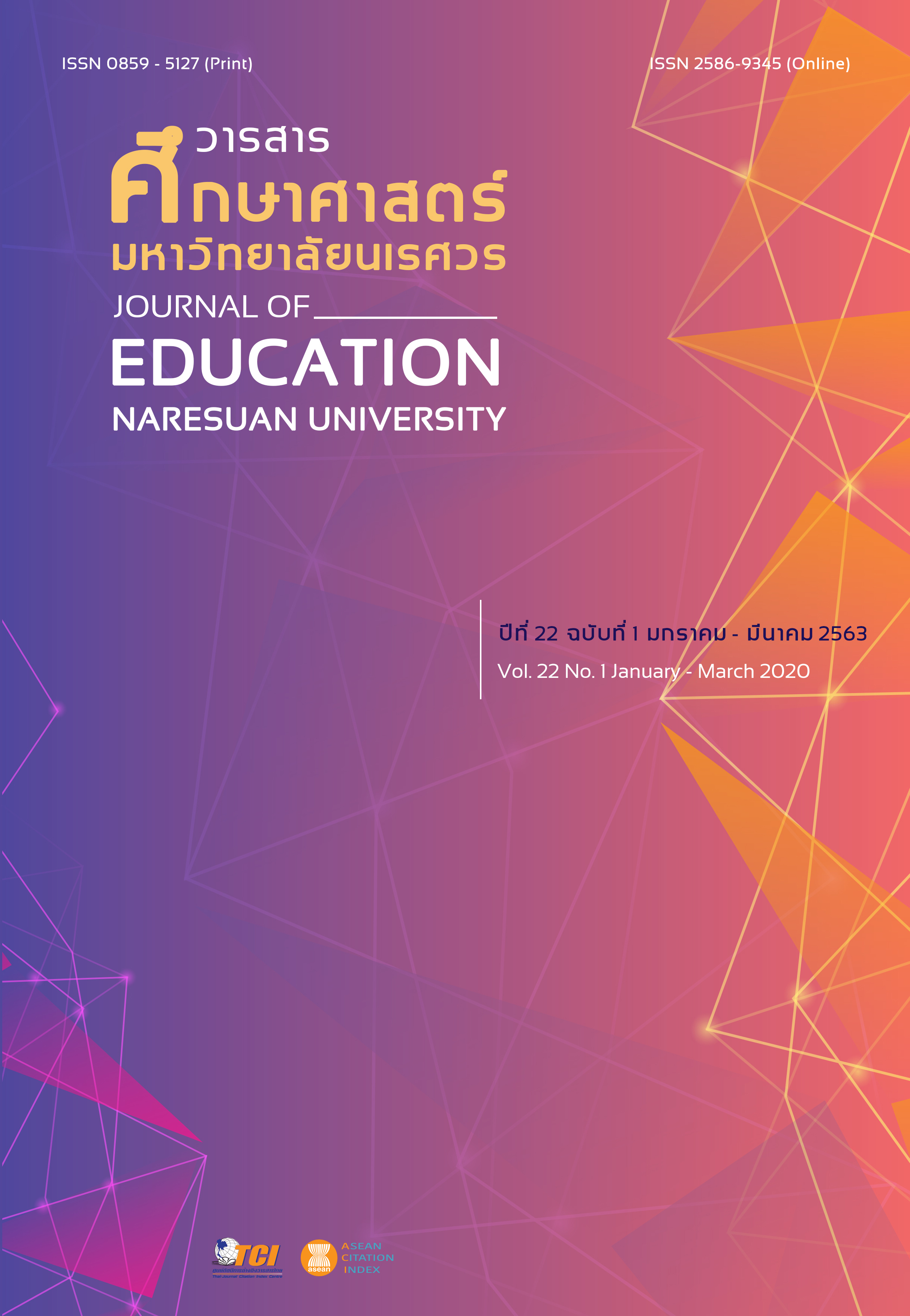โมเดลเชิงสาเหตุของการรับรู้ความสามารถตนเองที่เกิดจากอิทธิพลของอัตมโนทัศน์และคุณธรรมจริยธรรม
Main Article Content
บทคัดย่อ
การวิจัยนี้มีวัตถุประสงค์เพื่อพัฒนาและตรวจสอบความตรงของโมเดลเชิงสาเหตุของการรับรู้ความสามารถตนเองที่เกิดจากอิทธิพลของอัตมโนทัศน์และคุณธรรมจริยธรรมกับข้อมูลเชิงประจักษ์และเพื่อวิเคราะห์อิทธิพลของอัตมโนทัศน์และคุณธรรมจริยธรรมที่มีต่อการรับรู้ความสามารถของตนเอง กลุ่มตัวอย่างเป็นนักเรียนชั้นมัธยมศึกษาปีที่ 3 ในโรงเรียนสังกัดสำนักงานเขตพื้นที่การศึกษามัธยมศึกษา เขต 19 จำนวน 685 คน ได้มาโดยวิธีการสุ่มแบบหลายขั้นตอน (Multistage Random Sampling) เครื่องมือในการเก็บข้อมูลเป็นแบบสอบถามสำหรับนักเรียน ได้แก่ 1) แบบวัดอัตมโนทัศน์ของตนเอง 2) แบบวัดคุณธรรมจริยธรรม และ 3) แบบวัดการรับรู้ความสามารถตนเอง วิเคราะห์ข้อมูลโดยใช้การวิเคราะห์โมเดลสมการโครงสร้าง (SEM) ด้วยโปรแกรม Mplus ผลการวิจัย พบว่า 1) โมเดลเชิงสาเหตุของการรับรู้ความสามารถตนเองที่เกิดจากอิทธิพลของอัตมโนทัศน์และคุณธรรมจริยธรรม มีความสอดคล้องกับข้อมูลเชิงประจักษ์ (Chi Square = 52.474, df = 38, p-value = 0.0593, Chi Square/df = 1.380, RMSEA = 0.024, CFI = 0.997, TLI = 0.992 และ SRMR = 0.020, และ 2) การรับรู้ความสามารถตนเองได้รับอิทธิพลทางตรงจาก
อัตมโนทัศน์และคุณธรรมจริยธรรม นอกจากนั้นอัตมโนทัศน์ของนักเรียนยังส่งผลทางอ้อมไปยังการรับรู้ความสามารถตนเองโดยผ่านตัวแปรคุณธรรมจริยธรรม
Article Details
เจ้าของบทความมิได้คัดลอก หรือละเมิดลิขสิทธิ์ของผู้ใด หากเกิดการละเมิดลิขสิทธิ์ ไม่ว่าวิธีใด หรือการฟ้องร้องไม่ว่ากรณีใด ๆ ที่อาจเกิดขึ้นได้ กองบรรณาธิการวารสารศึกษาศาสตร์ ไม่มีส่วนเกี่ยวข้องทั้งสิ้น ให้เป็นสิทธิ์ของเจ้าของบทความที่จะดำเนินการ
เอกสารอ้างอิง
Bandura, A. (1977). Self-Efficacy as a determinant of career maturity in urban and high school seniors. Journal of Career Assessment, 5, 191-195.
Cheerachareonpong, S. (2013). Causal factors influencing positive thinking of senior high school students under the secondary educational service area 11. Veridian E-Journal, 6(3), 537-555. [in Thai]
Cheunban, C. (2010). Department of Mental Health suggested Thai people to positive thinking. Retrieved June 16, 2017, from https://www.manager.co.th/Home/ViewNews.aspx?NewsID=9510000132205 [in Thai]
Chongchanin, N. (2016). Factors affecting public intention of St. Louis College students (Master thesis). Bangkok: St. Louis College. [in Thai]
Dechkong, T. (2004, September). Are you good? Matichon, 36 – 39. [in Thai]
Iamsupasit, S. (2007). Theory and techniques of behavioral modification (6th ed.). Bangkok: Chulalongkorn University Press. [in Thai]
Jantarach, P. (2001). Factors affecting self-concept of the non-disciplinary problem student of the secondary school undo the department of general education, Muang District, Ubon Ratchathani Province (Master thesis). Khon Kaen: Khon Kaen University. [in Thai]
Ketumphai, C. (2006). A study of the relationship between some factors and self-regulation to revise the aggressive behavior of Matthayomsuksa 3 students in Chumphon (Master thesis). Bangkok: Srinakharinwirot University. [in Thai]
Limsuknirun, T. (1992). Variables related to moral reasoning among students (Master thesis). Bangkok: Srinakharinwirot University. [in Thai]
Phanmani, A. (2014). Practice to think creatively. Bangkok: Chulalongkorn University Press. [in Thai]
Prasertkul, S. (2008). The comparative study of positive thinking for senior high school students under Nakhonratchasima Educational Service Area VII with different levels of self-concept and life experiences (Master thesis). Bangkok: Srinakharinwirot University. [in Thai]
Saenprasit, K., Ardkaew, J., & Srijumnong, J. (2017). The development a causal model of factors influencing the analytical thinking abilities of the Prathomsuksa 6 students of schools under Loei Primary Educational Service Area Office 1: Multiple group analysis. Journal of Education Naresuan University, 19(2), 167-175. [in Thai]
Sangrawee, A. (2013). Some factors affecting the honesty of lower secondary school students in Nakhon Nayok Province (Master thesis). Bangkok: Srinakharinwirot University. [in Thai]
Tuksino, P. (2016). Model for measurement and evaluation of desired characteristics around National Education Standards and Development of Instrumentation of Attitudinal Structure Basic education (Research report). Khon Kaen: Khonkaen University. [in Thai]
Wanaintarayut, V. (2005). Development of causal models of intelligence emotional intelligence ethical intelligence and intelligence in face and overcoming hurts on student achievement (Master thesis). Bangkok: Chulalongkorn University. [in Thai]
Wattenberg, W. W., & Clifford, C. (1962). Relationships of the self-concept to beginning achievement in reading. Detroit: Wayne State University Press.
Wiratchai, N. (1999). Lisrel model: Statistical analysis for research. Bangkok: Chulalongkorn University Press. [in Thai]


